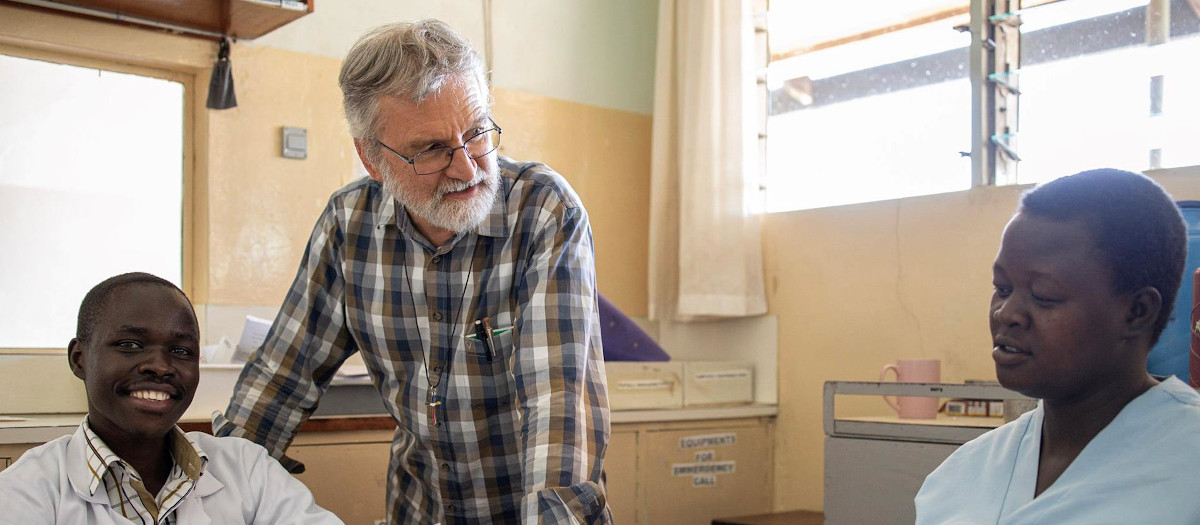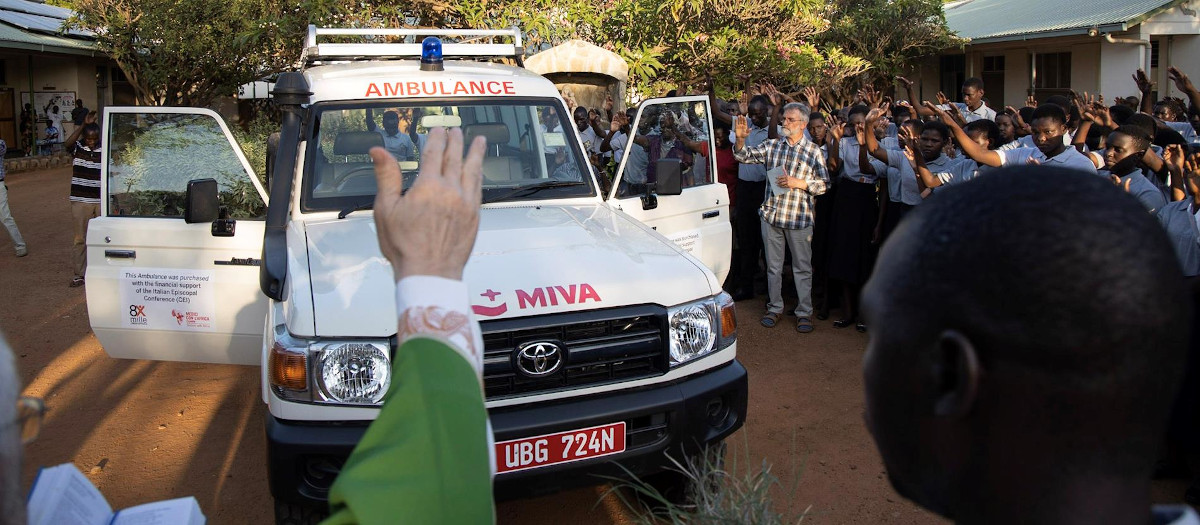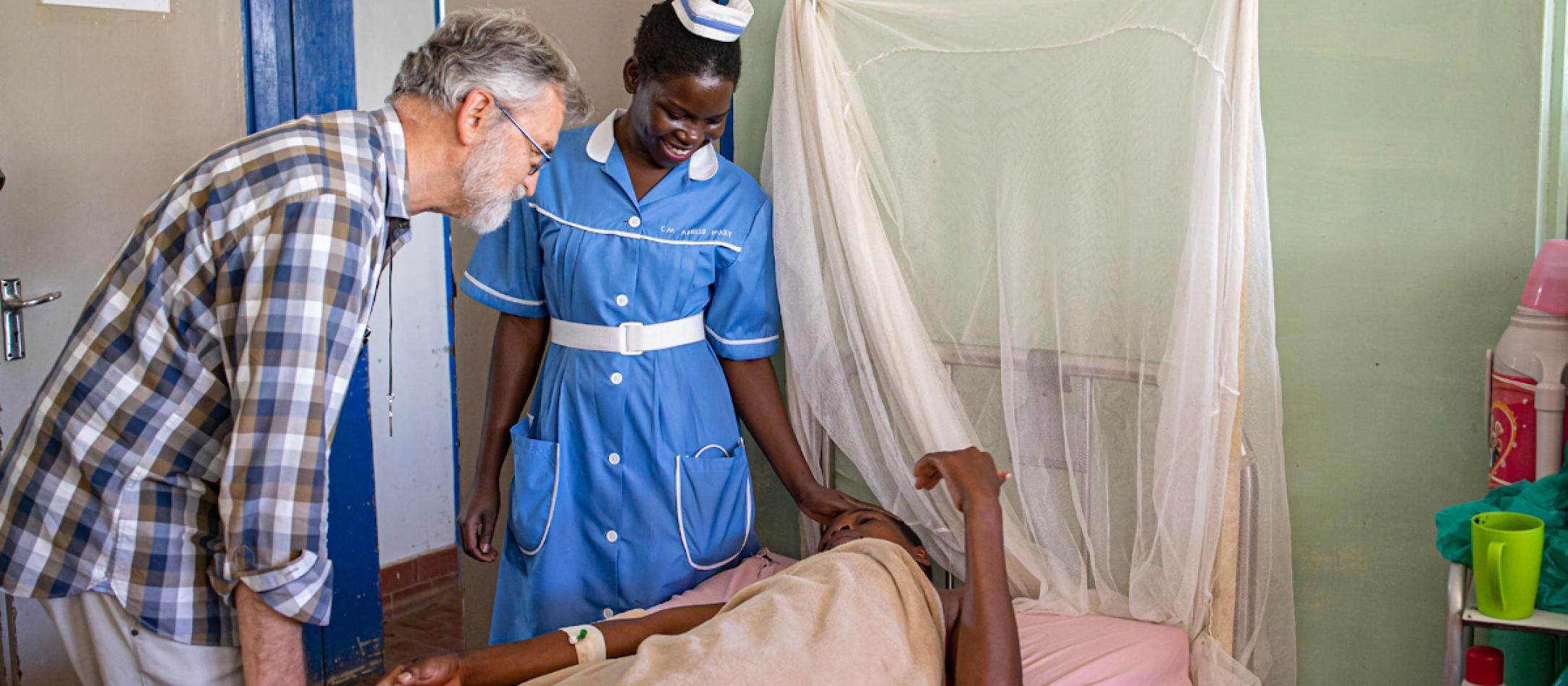Daniele Comboni
Missionari Comboniani
Area istituzionale
Altri link
Newsletter
Tuesday, June 9, 2020
Savannah in lockdown: Strict protective measures paralyze public life in Uganda – with dramatic consequences not only for the Comboni missionary Günther Nährich (in the picture), who has to buy medical equipment for the St. Kizito Hospital in Matany, in the northeast of the country. [Photo: © Ernst Zerche. Text: Cornelius Stiegemann – Katholisch.de]
Missionary in Uganda interviewed about protective measures and overcharging prices
Calm before the storm:
Brother Günther preparing the Matany hospital for Corona
The World Health Organization (WHO) currently reports 350 corona cases for Uganda. With a population of over 42 million people, this seems little, although the number of unreported cases is likely to be significantly higher. The country is hardly prepared for a major outbreak. That is why the government early adopted strict measures to contain the pandemic.
Brother Günther Nährich MCCJ is also directly affected. The Comboni missionary from Bopfingen in Baden-Württemberg heads the St. Kizito Hospital in Matany in the northeast of the country. Comboni Sisters founded the Health Unit in 1967 which was gradually expanded to a 250 bed Hospital, distributed to children's, medical, surgical, maternity and tuberculosis ward as well as the interior and surgery department. A nursing and midwifery school is affiliated with it. The hospital is located in one of the poorest regions in the country. As managing director, Brother Günther is responsible for all non-medical and nursing activities. This ranges from keeping personnel files to procuring clinical thermometers - which can be a challenge in times of the corona pandemic, as he reports in the interview.

Here he speaks to two of his employees. Picture: © Ernst Zerche
Question: What are the state measures against the spread of the virus in Uganda?
Nährich: Even before the first corona patient was registered in Uganda , schools and universities were closed on March 19 and 20. This also affected our nursing and midwifery school. There can be no more public meetings. Passenger and air traffic was stopped, the borders and most of the shops closed. Access to grocery stores and markets is only granted with the necessary distance. Later, the government also imposed a curfew at night, which is enforced rigorously along with the ban on assemblies. The measures taken to combat the pandemic can be clearly felt everywhere.
Question: How does this affect people's everyday lives?
Nährich: The usual greeting with a handshake is prohibited. This inevitably leads to a distance between people - and living together changes. The country seems paralyzed. In addition, food prices have risen so much that they are no longer affordable for ordinary people. Some have to settle for simple wild leafy vegetables that grow everywhere during the current rainy season. In the cities, these price increases are driving many people into starvation because they have been unable to stock food items. The urban population has grown dramatically in recent decades. Most people live in slums in confined spaces and earn their living from casual jobs and street trading. Now the livelihood for day laborers is lost, there is no substitute. Uganda has no social structures to accommodate the victims of the crisis and no resources to back up the dramatic consequences for businesses. On a positive note, the government has started to distribute food such as corn flour, beans and salt to needy populations in Kampala and the suburbs. The sick is given additional foods such as sugar and milk powder. This is a good start, but many people in need - especially in the countryside - are never reached.
Question: Do the government measures also have an impact on your everyday work?
Nährich: The lockdown has led to a sharp drop in the number of patients in the Hospital. Only 60 to 65 percent of the beds are currently occupied. We have a large catchment area. Due to the ban on public and private transport, patients from remote areas cannot reach the hospital. We continue to maintain an emergency ambulance service. But it is the rainy season and during heavy rains, our cars sometimes get stuck in the mud, so they have to be freed with a tractor. Because the work in the hospital continues on a regular basis and there are other tasks to be done, my everyday life is not restricted. However, the procurement of medicines and sundries is becoming more and more difficult as supplies are dwindling and prices have risen enormously. An infrared thermometer, for example at a price of 90 Euros in February, was offered at the end of March for 325 Euros.
Question: Are corona patients already being treated in your hospital or are there preparations for the first cases?
Nährich: There are still no corona patients here in Matany and in the entire Karamoja region. However, we have gradually prepared for the first cases. Initially, hand washing facilities were set up at the entrance to the Hospital, as well as in front of the various wards and offices. In addition, all patients who come to the outpatient clinic are asked to answer a questionnaire and their temperature is measured. We have limited the number of patient attendants and visitors. We have set up an isolation ward and the staff who volunteered to care for affected patients have been trained. Unfortunately, there is a lack of protective equipment. The small stock lasts for a maximum of two weeks. A "Corona Task Force" led by the health department meets in the District Headquarters each week, in which our Medical Superintendent and representatives of our primary health care team also participate.

Brother Günther Nährich is in the background. Picture: © Ernst Zerche
Question: What is the situation in the Christian communities? Are there still services or the sacraments being donated?
Nährich: No services have been held in Uganda since the lockdown in March. Administration of sacraments was also postponed. All 217 young people who were prepared for and were looking forward to the baptism during Easter Vigil celebration had to be suspended. Various Parishes offer online services, especially in cities where people have internet access. Here in the countryside, readings, short sermons and spiritual chants are broadcasted over loudspeakers on Sundays.
Question: What does this mean for the believers?
Nährich: Not being able to attend a service means a serious turning point for the people of Matany. For many who fill the great church during two services Sunday after Sunday, the celebration together is the central event of the day and their practice of faith. For this they dress with care, participate with great enthusiasm, bring in their wonderful, moving songs and express their joy with dancing, clapping and loud cheers. Community and solidarity is strengthened and also expresses itself specifically in the fact that the little that people have is shared in the collection.
Question: How is the life of faith in your community?
Nährich: In Matany we celebrate every Sunday the Eucharist as an apostolic community - that is, together with the two sister communities - in the courtyard of the Mission. We keep social distance as this rule applies also here. During the week the Eucharist is celebrated alternately in the different communities; we also maintain the Daily morning and Evening Prayers. In addition, during this Corona period, we Comboni Missionaries in Uganda keep one hour of adoration every evening in which we pray for the end of the pandemic and also feel connected to our sisters and brothers in the Parish and worldwide.
Question: What is your perspective for the next few months?
Nährich: According to media reports, there are now 350 Covid-19 infections in Uganda. Many of them are said to have already recovered. There are no reports about people who have succumbed the disease. However, this broadcast cannot make us feel relaxed. There is too little testing and mortality is high in the country anyway. For this reason, these official statements are hardly worth the paper they are printed on. We will continue our journey here with caution and prudence and also with confidence. We do our part to avoid worse things. We also ask God to avert the pandemic from humanity here and everywhere in the world. In this attitude and in this way, we realise our motto: We dress the wound - God heals it.
[Cornelius Stiegemann, Matany/Bonn – Katholisch.de]




